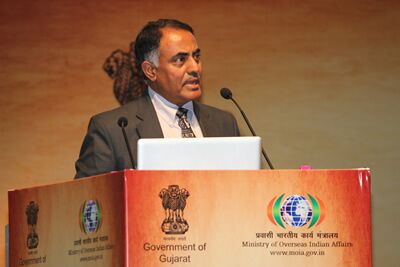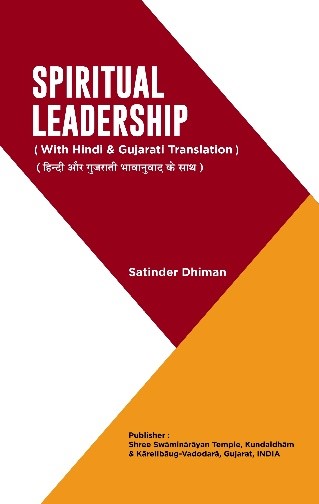Dr. Satinder Dhiman on Spiritual Leadership and Sustainable Living
 Dr. Satinder Dhiman recently published a book titled, “Spiritual Leadership,” as a trilingual edition, consisting of English, Hindi, and Gujarati (Gujrat, India: Shree Swāmīnārāyan Temple, Kundaldhām & Kārelibāug- Vadodarā).
Dr. Satinder Dhiman recently published a book titled, “Spiritual Leadership,” as a trilingual edition, consisting of English, Hindi, and Gujarati (Gujrat, India: Shree Swāmīnārāyan Temple, Kundaldhām & Kārelibāug- Vadodarā).
The book presents a view of spiritual leadership, which largely embraces servant leadership. It represents a shift from followers serving leaders to leaders serving followers. Spiritual leaders are authentic leaders and practice what they preach. Like Gandhi, Nelson Mandela and Mother Teresa, they become the change they wish to see in the world. They do right things for right reasons. Spiritual Leaders are not motivated by personal desire or ambition. They become instruments of the Whole and selflessly work for the wellbeing of all being. Only those who have renounced personal ambition can truly serve.
 Dr. Dhiman also served as the lead author in a recently published peer reviewed article in the Winter/Spring edition of The Journal of Values-Based Leadership. Under the title, “Celebrating Diversity through Spirituality in the Workplace: Transforming Organizations Holistically”, authors Dhiman, Modi, and Kumar discuss key advantages of celebrating diversity, pinpoints barriers to organizational diversity, and offers some perspectives to overcome barriers to inclusiveness.
Dr. Dhiman also served as the lead author in a recently published peer reviewed article in the Winter/Spring edition of The Journal of Values-Based Leadership. Under the title, “Celebrating Diversity through Spirituality in the Workplace: Transforming Organizations Holistically”, authors Dhiman, Modi, and Kumar discuss key advantages of celebrating diversity, pinpoints barriers to organizational diversity, and offers some perspectives to overcome barriers to inclusiveness.
On April 26, Dr. Dhiman gave a keynote address titled, “Sustainable Living: A Healthy, Humane, and Sustainable Diet”, at the Eco-Issues 2019: Antelope Valley College’s First Inaugural Environmental Summit.
This keynote explored the vital role each individual can play to improve the state of the planet. It focused on understanding the economics, ethics, and ecology of a meat-based vs. plant-based diet—something that concerns everyone and over which everyone has complete choice and control. It offered the unique perspective that all food is essentially vegetarian; although one can have a meal that is non-vegetarian. The keynote focused on three main reasons to turn to a plant-based diet: health, sustainability, and compassion. It offered the perspective that switching to a plant-based diet or reducing the meat and dairy intake represents one of the most effective solutions to global warming. The uniqueness of this approach lies in its humanity and its locus of control: It depends upon each one of us.